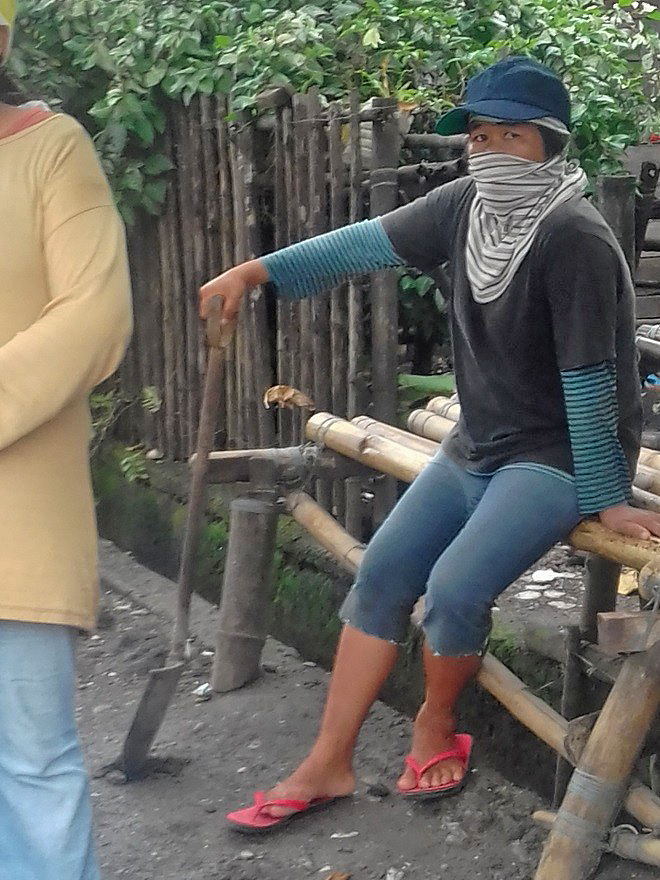Story by Necil H. Bigno, DSWD Kalahi-CIDSS Community Empowerment Facilitator

Rodelyn D Cabrera, 37, Purok 2, Lower Sagadan, Baroy, Lanao del Norte taking a break from construction work at the site of the 120 Linear Meter Seawall community sub-project.
Rodelyn D Cabrera, 37, Purok 2, Lower Sagadan, Baroy, Lanao del Norte, is married to Enrico Cabrera and is a mother of two. Enrico is a fisherman, however, this is not enough to sustain their family’s basic needs.
Rodelyn accepts “labada” (laundry services) from their neighbors. There are times when she even accepts all-around household cleanups. Rodelyn exerts more effort in ways to produce income – other than their children, they are raising three other children, abandoned by her sister who is a widow.
Rodelyn’s family is a Pantawid Pamilyang Pilipino Program (4Ps) beneficiary, and falls under the level one (or survival stage) based on the social welfare assessment. This means that the family belongs to the poorest of the poor.
Jenny Cabatingan, a 4Ps Municipal Link endorsed the family for prioritization in the work once the construction of the DSWD Kalahi-CIDSS Community Sub-Project began.
In September of 2016, the community sub-project of Lower Sagadan started, Enrico was among the workforce. Enrico, however, only lasted for a day, fallen ill and unable to continue. The Barangay Sub-Project Management Committee (BSPMC) of Lower Sagadan, on the other hand, acknowledged that the family needs the opportunity to work in the construction considering the number of children they raise.
Rodelyn was then advised to continue the work for her husband. This housewife in turn blossomed into a graceful yet vigorous construction worker as the implementation of the community sub-project progressed. Other laborers noticed that Rodelyn was doing the work faster than the others, one enthused that “grabe na si Rodelyn, kung mopala mas paspas pa kaysa sa lalaki, murag wala sa bokabularyo niya ang bughat (Rodelyn is really good, she shovels faster than the men, as if the word relapse isn’t found in her vocabulary).”
Rodelyn says, “pagkahuman nako diri sa construction, moadto pa ko sa bukid para mangahoy kay dili nako masaligan ang akoang bana nga moadto didto kay naay sakit (after I work in the construction site, I still need to go find firewood, I cannot rely on my husband for that, now that he has an illness).”
The community sub-project follows a “shifting” method of cycling through the workforce who are also members of the community, each laborer is allotted a 1-week schedule due to the bulk of interested takers. However, a foreman can recommend for a laborer to continue for other schedules to expedite construction progress, in turn, the laborer will be able to continue working on the following shift.
The foreman took notice of Rodelyn’s hard work and enthusiasm as she is always on the foreman’s list of laborers, “kung naa ang akoa pangalan sa lista maam, motrabaho ko (if my name is on the list, I would really work)” Rodelyn says.
Though the pay she received from working on the sub-project was not enough to sustain daily needs and her husband’s medication, Rodelyn says she is still thankful for the opportunity, and hopes that there could be more community-based projects where the community can earn while implementing the projects.
“Bahalag init o maulanan ko pagkahapon basta tagaan lang ko sa Ginoo ug maayo nga panglawas, motrabaho jud ko para sa akoang pamilya (I don’t mind the heat or rain, as long God gives me good health, I will work for my family)” Rodelyn concludes.
The DSWD Kalahi-CIDSS community subproject in Lower Saganan, Baroy, Lanao del Norte is the construction of a 120 Linear Meter Seawall which stretches from Purok 2 through Purok 5 of the barangay and costs P2,825,874.00. The DSWD Kalahi-CIDSS grant of P2,509,291.94 and a local cash counterpart from the Province of Lanao del Norte of P46,946.00.
The Municipality of Baroy also provided a total of P169,853.00, both in cash and in-kind local counterparts. The Barangay Local Government of Lower Sagadan also contributed 10% of their barangay development fund amounting to P32,083.06.
The community of Lower Sagadan also provided a total of P67,700.00 in-kind contributions. The community also accomplished the sub-project within the 90 calendar days stipulated in the sub-project implementation from September to December 2016.
Community-Driven Development (CDD) is an approach that gives the community control of the development process, resources and decision making authority and regarded as the best assessors of the needs that their communities. The communities also have the responsibility of implementing, managing, and operating the sub-projects they have planned as well as maintenance. In the Philippines, CDD is implemented through the Kapit-Bisig Laban sa Kahirapan Comprehensive and Integrated Delivery of Social Services – National Community-Driven Development Program (Kalahi-CIDSS NCDDP) under the Department of Social Welfare and Development (DSWD).


